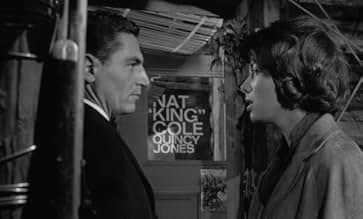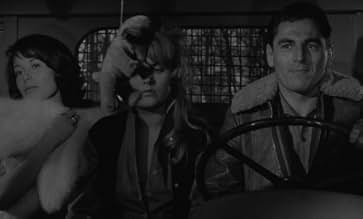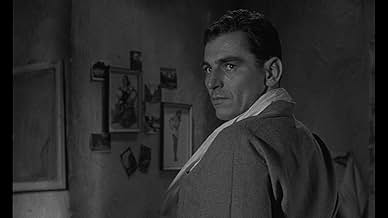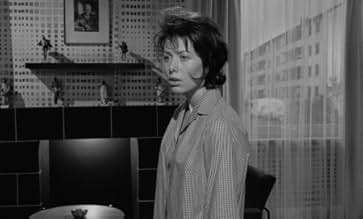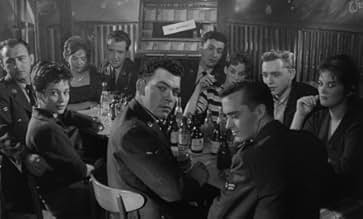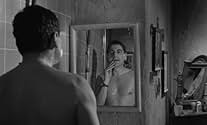Aggiungi una trama nella tua linguaA West German trucker who illegally sells black gravel reunites with a former lover, now married to an American.A West German trucker who illegally sells black gravel reunites with a former lover, now married to an American.A West German trucker who illegally sells black gravel reunites with a former lover, now married to an American.
- Regia
- Sceneggiatura
- Star
Recensioni in evidenza
"Schwarzer Kies" is an extremely bleak movie that makes me wonder it ever found enough supporters to get made at all. The dark, disturbing story is portrays a German village living off an American Air Force Base (around 1960) mostly by cheating and prostituting. It is not surprising that the film didn't do much money at the box office. And the film was hurt by an accusation of antisemitism, which led to being recut to avoid a bad press. The accusation was a clear misinterpretation. What the film really did, was to show that antisemitism was still around and some people had not changed.
The Americans (all played by German actors) do not appear much better than the Germans. Their plan to build a rocket launch base does not sound very promising for peace. The soldiers are shown mainly frequenting a local bar/bordello and the officers checking bills and hoping to leave soon for a better post. Director Helmut Käutner did not spare many, most people in his film are in some way cunning, every one seems to be involved or at least in the know of the black market around the base. From the very first scene to the very last, the film is most uncompromising in his portrait of greed, lust and bondage.
The actors are all unknown today although they did a good job. It is a Germany we have never seen on film before or even after. It took guts to get this film made. The Friedrich Wilhem Murnau Stiftung did a great job restoring the film to its original lenght and optical quality.
The Americans (all played by German actors) do not appear much better than the Germans. Their plan to build a rocket launch base does not sound very promising for peace. The soldiers are shown mainly frequenting a local bar/bordello and the officers checking bills and hoping to leave soon for a better post. Director Helmut Käutner did not spare many, most people in his film are in some way cunning, every one seems to be involved or at least in the know of the black market around the base. From the very first scene to the very last, the film is most uncompromising in his portrait of greed, lust and bondage.
The actors are all unknown today although they did a good job. It is a Germany we have never seen on film before or even after. It took guts to get this film made. The Friedrich Wilhem Murnau Stiftung did a great job restoring the film to its original lenght and optical quality.
(1961) Black Gravel/ Schwarzer Kies
(In German with English subtitles)
CRIME DRAMA
Co-written and directed by Helmut Käutner that has gravel dump truck driver, Robert Neidhardt taking advantage of a situation slipping out and stealing some gravel after a dog had been killed. But before he throws the lifeless dog to be buried by the gravel itself, he would then steal it's collar while the crowd are paying attention to the fight between one of the workers and the soldiers. And while driving along the empty gravel road, he would then notice a major, John Gaines (Hans Cossy) and his wife stranded in the middle of the road and he decides to stop. And it was not until he stepped into the major's car Robert sees someone he recognizes, and she happened to be an old flame, Inge Gaines (Ingmar Zeisberg). And for the price of 10 dollars during Robert was towing the major's car back to the base of Sohnen, the rope breaks out, and they both agree Inge would ride with Robert back into town and call for a toll truck/ mechanic. And during their conversation, she then informs him she is looking for her dog to which it just happens to be the same one that was killed at the opening. Except that he has plans to use the dog's collar as a ruse to meeting her again as they had a history together before she met her current husband as he has a girlfriend, Elli (Anita Höfer) he does not care too much about. Robert is also friends with Sgt Bill Rodgers (Peter Nestler) and his girlfriend Anni Peel (Edeltraut Elsner) are going to cross paths again under unfortunate circumstances with a guy named Eric Moeller (Heinrich Trimbur). And another guy, Otto Krahne (Wolfgang Büttner) who was a part of his racket but has decided to move to Canada.
While watching this reminded me of another movie called "Night and the City" starring Richard Widmark when the center person, Robert gets himself into trouble and digs himself into a bigger hole.
For a movie such as this I think I prefer the much more ambiguous ending that was intended than the one the director had intended if according to Eddie Mueller is correct. The gravel itself could have been symbolic and metaphor since viewers are not clear where a particular two people had been buried other than the dog.
Co-written and directed by Helmut Käutner that has gravel dump truck driver, Robert Neidhardt taking advantage of a situation slipping out and stealing some gravel after a dog had been killed. But before he throws the lifeless dog to be buried by the gravel itself, he would then steal it's collar while the crowd are paying attention to the fight between one of the workers and the soldiers. And while driving along the empty gravel road, he would then notice a major, John Gaines (Hans Cossy) and his wife stranded in the middle of the road and he decides to stop. And it was not until he stepped into the major's car Robert sees someone he recognizes, and she happened to be an old flame, Inge Gaines (Ingmar Zeisberg). And for the price of 10 dollars during Robert was towing the major's car back to the base of Sohnen, the rope breaks out, and they both agree Inge would ride with Robert back into town and call for a toll truck/ mechanic. And during their conversation, she then informs him she is looking for her dog to which it just happens to be the same one that was killed at the opening. Except that he has plans to use the dog's collar as a ruse to meeting her again as they had a history together before she met her current husband as he has a girlfriend, Elli (Anita Höfer) he does not care too much about. Robert is also friends with Sgt Bill Rodgers (Peter Nestler) and his girlfriend Anni Peel (Edeltraut Elsner) are going to cross paths again under unfortunate circumstances with a guy named Eric Moeller (Heinrich Trimbur). And another guy, Otto Krahne (Wolfgang Büttner) who was a part of his racket but has decided to move to Canada.
While watching this reminded me of another movie called "Night and the City" starring Richard Widmark when the center person, Robert gets himself into trouble and digs himself into a bigger hole.
For a movie such as this I think I prefer the much more ambiguous ending that was intended than the one the director had intended if according to Eddie Mueller is correct. The gravel itself could have been symbolic and metaphor since viewers are not clear where a particular two people had been buried other than the dog.
Helmut Wildt works on the regrading of the road leading to the US Air Force, transporting gravel. He also steals some of it and sells it on the black market. The US officer in charge of the work, Hans Cossy, is married to Ingmar Zeisberg, a former lover of Wildt's; she claims to prefer her new, settled life, but she keeps returning to Wildt's side. When they are out driving in his dump truck, he runs into a young couple, killing them. They wind up under the road's gravel. But a investigation puts pressure on the two. Will Fraulein Zeisberg's faltering remorse overcome Wildt's implacable nihilism?
Helmut Käutner's dark tale of Germany's lingering, evil underside is a tough watch, what with survivals of fascist archetypes, old men with blue numbers tattooed on tir wrist, and a hunger for something solid and real. It was denounced, edited to remove social commentary, and given a lighter ending. The original cut was restored in the 2010s.
Helmut Käutner's dark tale of Germany's lingering, evil underside is a tough watch, what with survivals of fascist archetypes, old men with blue numbers tattooed on tir wrist, and a hunger for something solid and real. It was denounced, edited to remove social commentary, and given a lighter ending. The original cut was restored in the 2010s.
In post-war Germany, in a dreary small town near a US air force base, some of the local truckers hired by the Americans to supply the base with gravel and other construction supplies have a side job in the black market. Trucker Robert, underplayed to anti-hero perfection by Helmut Wildt, lives in a room above a brothel-bar in town and has an emotionless relationship with one of the B-girls (Anita Hofer) who has a yen for him. One day he spots an old flame(Ingmar Zeisberg), now married to an American officer running the base, and attempts to relight their fire in secret, a decision that leads to a tragic accident. It's all downhill after that.
It's downbeat, but one of the most compelling dramas about post-war Europe I've ever seen. It was cut to remove an anti-Semitic outburst by a bar drunk but restored in 2009. The tech credits and all of the performers, from the main actors to the extras, are excellent. It hasn't been shown on Noir Alley--it should-- but Eddie has programmed it at several festivals. Directed and co-written by Helmut Kautner, it was not the kind of commercial film the West German studios were producing in the late 1950s and 1960s.
It's downbeat, but one of the most compelling dramas about post-war Europe I've ever seen. It was cut to remove an anti-Semitic outburst by a bar drunk but restored in 2009. The tech credits and all of the performers, from the main actors to the extras, are excellent. It hasn't been shown on Noir Alley--it should-- but Eddie has programmed it at several festivals. Directed and co-written by Helmut Kautner, it was not the kind of commercial film the West German studios were producing in the late 1950s and 1960s.
A 1961 German film which was presented on Noir Alley which qualifies for being a neo-noir. It's post war Germany & the residents are trying to make ends meet while under the scrutiny of the American armed forces still stationed there. Our anti-hero, Helmut Wildt, is met making his rounds driving a truck which carries the occasional black market item but one day he runs into a military man & his wife, Ingmar Zeisberg, stranded by the side of the road & offers them a ride into town for help. He recognizes Zeisberg as an old flame & they reunite awkwardly but her new life & his current one is at odds w/them actually making any headway. They do eventually hook up & one night while they're driving in his truck unbeknownst to them a pair of lovers, who Wildt knows, end up being run over by his truck which prompts Wildt to take care of the situation while he tries to keep Zeisberg out of it. What follows is chapter & verse of what we've come to expect from noir but here done exceedingly well w/Wildt being championed by the audience, no matter how rotten he seems, to succeed but we know that's not the case even though according to host Eddie Muller even German audiences felt the ending was too bleak for them which says a lot.
Lo sapevi?
- QuizFirst German film shown on TCM's "Noir Alley" on 14 December 2024.
- BlooperAnni and Bill invite Bob into the back of their car to get out of the rain. BUT once in the car Bob's hair and jacket collar are dry, even though the rainfall on the rear window is quite obviously quite significant.
- Versioni alternativeShortly after its general release, the film was changed from its premiere cut. Due to complaints by the Central Council of Jews in Germany, two scenes were shortened in which a character is revealed to be a Holocaust survivor and an antisemitic slur is used against him. The ending was also changed and is much less dark: in the shortened cut, both Inge and Robert survive. The premiere cut was restored during the film's digital restoration in 2016.
I più visti
Accedi per valutare e creare un elenco di titoli salvati per ottenere consigli personalizzati
Dettagli
- Tempo di esecuzione1 ora 53 minuti
- Colore
- Mix di suoni
- Proporzioni
- 1.66 : 1
Contribuisci a questa pagina
Suggerisci una modifica o aggiungi i contenuti mancanti

Divario superiore
By what name was Asfalto nero (1961) officially released in India in English?
Rispondi
